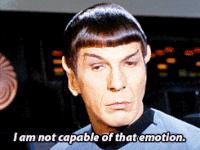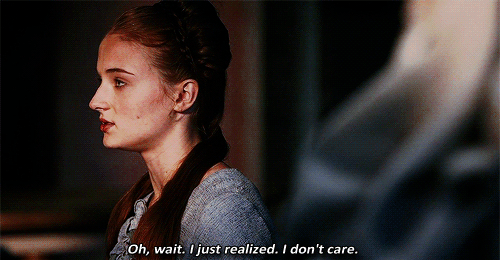I’ve never been one for Writing Advice™ – giving it or taking it. In fact, my best advice would be “don’t take advice” because YOU DO YOU. Nobody else can write YOUR story, only YOU. < That’s the kind of stuff you would have heard me say if you’d asked for my advice a year ago.
But! I’ve learned a thing or two since then. Not to say I now recommend taking Writing Advice™ – because I still don’t. However, what I do recommend is STUDYING THINGS in your own time.* Look at your favorite books, movies, TV shows. Study the stories and figure out why they are your favorites. How do they make you feel? Why do they make you feel? Exploration. It’s the best thing you can do for yourself as a writer.
SO THAT BEING SAID, we’re going to do a little exploring today. I’m lovingly calling the advice I have for you “the three golden rules of writing that nobody talks about!” It’s not that nobody talks about these things…but very few people do. I’ve had to search high and low for advice like this. Most of the Writing Advice™ I see is all about STRUCTURE! and CHARACTER ARCS! and STEPHEN KING’S MORNING ROUTINE! which is all fine and good…but I’ve never found it helpful. SO LET’S DO SOMETHING NEW AND DIFFERENT. Grab a waffle and some tea and probably a helmet because this anti-writing-advice might just blow your mind.
*preferably stories in this case but if you want to study water buffalo or something hey who’s stopping you
1. STORYTELLING BEATS WRITING, EVERY TIME
There’s something about a story, isn’t there? Whether you’re aware of it or not, your brain is literally hardwired to desire story – to connect with it, engage with it, and demand to know what happens next.*
A well-told story is powerful – and can be wholly achieved without “good writing.” Your prose might be the most beautiful thing on earth…but if you don’t have a good story (or even worse – your pretty writing is HIDING your story) then no one is going to pay attention to it. At least, very few people will – the kind of people who like complicated poetry.
This is NOT a dig at poetry. But it needs to be mentioned. Because every poet can relate to the struggle of “nobody buys poetry books!” Here’s why: because in order to understand most poetry, you have to REALLY think about it. Watch carefully. The hand is quicker than the eye. It’s like magic, see? No? READ IT AGAIN. Maybe you’re just nOT SMART ENOUGH TO GRASP THE FULL CONCEPT OF A GRECIAN URN. < In order to understand most poetry, you have to “surpass the boundaries of common intellect,” to put it…well…poetically.
This is why most poetry does not sell.** Because most readers just want a good story – actually, to be more specific, most readers just want to FEEL something. And sadly, a lot of writers follow a path that takes them in the opposite direction. They believe the myth that “in order to be a good writer…you have to be a good writer.” But that’s simply not true. In order to be a good writer, you have to be a good storyteller.
*shoutout to Wired For Story by Lisa Cron << YOU KNOW IT MUST BE A GOOD BOOK WHEN I NEVER RECOMMEND BOOKS ON WRITING. BRO. IT’S SO GOOD. READ IT.
**SIDE NOTE: take a gander at Milk And Honey by Rupi Kaur. I haven’t read this book, but I’ve seen excerpts and asdfghjkl REALLY GOOD STUFF. And it’s a bestseller. Why, though?? Because you can understand this poetry without having to THINK about it for a long time. It makes you FEEL something. We’ll talk more about that in a minute.
Now, don’t get me wrong – I believe that you can be both a good writer and a good storyteller. You can have beautiful, descriptive prose and still tell a story that is compelling and emotional to readers. But WATCH OUT: as a writer, I know firsthand how easy it is to get enraptured by your own flowery, metaphorical, romantically maladaptive language. (< LIKE THAT) But just remember this psychological truth: a confused mind always says no.
It’s science, which means you can’t help it. You do it, too – all the time. Don’t be that author you decide to try, but give up on after a few pages because they made you feel lost, dazed, and – let’s just say it – STUPID with their “good writing.”
If you’re anything like me, you’ve read New York Times bestsellers and more than once you’ve thought to yourself, “How is this book so popular? The writing is nothing special!” Cult books and right-place-right-time publishing contracts aside, this is why popular books are popular: they take the reader on an emotional journey. They make the reader FEEL SOMETHING.
Which leads us to our next golden rule…
2. ALL STORIES ARE CHARACTER-DRIVEN
Wow, what a bold claim! HOW DARE I. After all, plot is important. At least, that’s what most Writing Advice™ tells me. But, as I hope you’re agreeing with by now, most Writing Advice™ is not particularly helpful.
Yes, a plot can be riveting, fascinating, deep, thoughtful, even AMAZING – but without characters? A plot is nothing. Because a plot is what happens. That’s it. But characters are who what happens happens to. (lol I promise I’m a professional writer I promise.)
Characters, Plot, and Setting are all terms you hear a lot in the writing world. But right now, think of them as survival tools: water, food, and shelter. Yes, it’s nice to have all three – but if you don’t have THE WATER you WILL DIE. Harsh reality, sorry. The food and the shelter are no good if you are dead. So what do you need? Water. Think of characters as water: the first thing you look for if you’re ever stranded in the jungle.*
CHARACTERS ARE YOUR STORY’S LIFEBLOOD. Without them, the plot and the setting mean nothing. Why? Because characters are you – the skin in which the reader lives, while they experience your story. Without a pair of eyes to see your story’s world through…how can the reader feel anything? SPOILER ALERT THEY CAN’T.
Remember the words I used to describe plot? Riveting, fascinating, deep, thoughtful, amazing? Those are all emotional responses. And who feels emotions? PEOPLE. CHARACTERS.** Without characters, your story is emotionless and therefore = boring.
Now, OBVIOUSLY I’m preaching to the choir, right? OBVIOUSLY you all have characters in your books, right? If yes, then I have a question for you: why are you worried about your plot? Why are you worried about following a particular structure because “that’s what other bestselling books are like”? PLOT MATTERS, YES. But it doesn’t matter as much as your characters. If you make me connect with your character on page one, I don’t care where plot goes. My brain wants to know what happens next because I feel emotionally attached to that character. < It’s seriously as simple as that.
Remember: characters are the water, plot is the food. You can go hungry for a while, but you cannot live without water. And if you have the Most Amazing Plot Ever™ but your reader feels no emotional connection to your characters? Your book goes back on the shelf and your ex-reader walks away.
*hopefully you already knew that because if you just learned that from me what the heck go sort out your life would you
**although your characters can totally not be people too. like if you write stories about water buffalo or something then hey bro give me some of that. BUT YOU BETTER MAKE ME FEEL WHAT THOSE WATER BUFFALO ARE FEELING DANG IT.
3. BODY LANGUAGE SPEAKS LOUDER THAN WORDS
This is something I’ve picked up simply from studying good acting* in film: the power of body language and outward emotional cues. Here’s what I mean:
Close your eyes and think of the best-acted movie/TV show you’ve ever watched. Got it? Now, think of the way the characters made you feel what they were feeling. Did they speak their thoughts out loud? No. Did they confess their innermost feelings so that everyone watching would follow along? Probably not. If a character in the scene was angry, did they simply come right out and say: “I’M ANGRY”?? Nope.
That’s the thing about good acting – it is seen and not heard.** You can FEEL the way a character is feeling simply by their posture, their facial expression, even the glint in their eyes. Never does the film have to stop everything to let you know THIS IS HOW THE CHARACTER FEELS. Why? Because it’s all visual. And I believe you can achieve the same thing in writing.
Yes, writing is very different. You have no distinct imagery or music to heighten the emotional response of your reader. But!!
YOU HAVE THEIR IMAGINATION. When someone is reading your book, you have control over their mind (pretty awesome, huh?) and you’re telling them what to visualize – but here’s where it gets tricky: there’s a right and wrong way to tell them.
YOU HAVE THEIR IMAGINATION. When someone is reading your book, you have control over their mind (pretty awesome, huh?) and you’re telling them what to visualize – but here’s where it gets tricky: there’s a right and wrong way to tell them.
Remember the body language VS character blurting “I’M ANGRY”? Same thing. Show me what anger looks like. This is a movie in my head, after all. Maybe your character (or water buffalo) is shouting, throwing sharp hand gestures, and glaring. Or if you’re writing from a character’s POV, show me how anger feels. Your face is hot, your muscles are tight, and your heart is pounding.*** This is one of the most vital things because if I can’t feel what your character feels, I AM WALKING, BRO.
In order for me to care about your characters, they have to be inwardly and outwardly emotional. In other words: they have to be human like me. IT SOUNDS SO SIMPLE BUT I NEVER THOUGHT ABOUT IT LIKE THIS BEFORE.
*British acting
**LIKE ALL GOOD CHILDREN AM I RIGHT
***If you’re interested in this body language thing and you’re like “yeah that’s cool but idk what every emotion feels like and how people respond to them” PERFECT BECAUSE I HAVE ANOTHER BOOK FOR YOU: The Emotion Thesaurus by Angela Ackerman and Becca Puglisi. < this book is basically a reference guide to emotional reactions and IT IS BEAUTIFUL.
ALL THESE GOLDEN RULES HAVE A SIMILARITY
Have you figured out what it is? I’ll tell you: FEELS. We are emotional messes, us humans. Let’s just face it. We love stories because we get to experience unbridled joy and agonizing grief and crippling anxiety and forbidden love ALL FROM THE COMFORT OF OUR HOMES. Your brain craves story because FEELINGS. At the end of the day, that’s what it’s
all about.
all about.
This doesn’t mean you can’t have an intricate plot, fascinating scientific facts, deep themes, and epic world-building in your book – all of that is good. But first and foremost, you have to make me FEEL SOMETHING. And through 1) good storytelling, 2) relatable characters, and 3) real emotional responses, I have great faith you’ll do just that. GO FORTH AND WRITE.
TALK, BRO
What do you think? Do you agree with my golden rules of writing? Can you add to this list with something important you’ve learned about writing? Are you discouraged by other Writing Advice™?? I AM IN CASE I FORGOT TO MENTION. Do you aspire to be a good writer, or a good storyteller? OR BOTH?? LET’S DISCUSS THIS SHALL WE.
rock on,
abbiee













